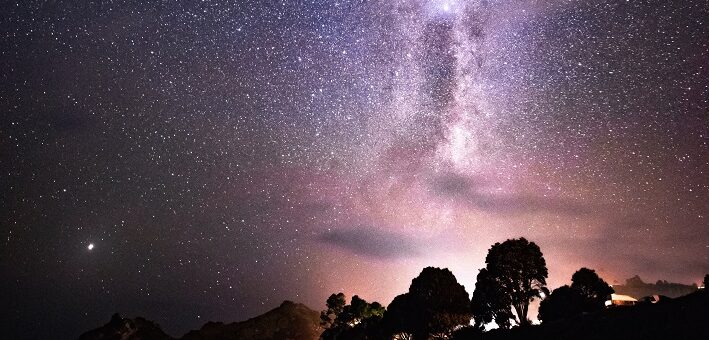Commentary on Matthew 2:1-12
Epiphany is a promise that God is here, whether or not we notice the signs.
After Jesus is born, according to Matthew, it is not the local folk to whom God-with-us is first revealed, but rather to Magi from the East. Foreigners. Strangers. Outsiders who interpret dreams and interrogate the night sky for signs.
Nor is it in the grand holy city of Jerusalem, with its magnificent temple at the center of religious, political, and economic power, where God chooses to come close, but rather in Bethlehem, a lowly village up the road a piece.
And it is not the great and powerful King Herod on whom God’s anointing rests, but on this vulnerable child-Messiah who “will save his people from their sins” (Matthew 1:21).
Tyranny and terror
“The time of King Herod” (Matthew 2:1) refers to Herod the Great, who ruled circa 37–4 B.C.E.—a terrifying era fueled by chaos and trauma for the Jewish people. To be sure, Herod’s immense wealth funded numerous (and beautiful) building projects, including multiple palatial fortresses as well as the reconstruction and expansion of the Jerusalem temple.
But Herod was also a ruthless tyrant, cementing his authority by brutal displays of dominance. He was perfectly willing to torture and kill his (perceived) opponents, even his own wife and sons. He reflects the reality that tyrants will too often do whatever it takes to protect their rule, even if it means destroying innocent lives.
In Herod’s view, could there be a greater threat to his rule than one who is prophesied in ancient texts and acknowledged as king by gentiles from afar? If this child-king is the Messiah, he will rule under the authority of God—unlike Herod, whose political strings are held by Roman puppet-masters. No wonder Herod is frightened.
The passive form of the verb expressing Herod’s fright, tarassō, means to be confused, troubled, or stirred up, even terrified, which is how the New Revised Standard Version typically translates it in Synoptic use.
Herod is terrified of losing power, and Matthew says the people of Jerusalem are terrified as well—no doubt aware of the crushing blows they will suffer under any conflict between Herod and anyone he opposes. Their fears prove to be justified when Herod later orders the murder of young boys in an attempt to destroy the child Jesus (Matthew 2:16–17).
History and current events are rife with other examples of earthly powers that are manifested through violence, killing innocent victims along the way. Indeed, this child, whose birth is marked by a rising star, will die by such violence.
Even in the light of such an end, the Gospels are clear that God’s way is not through earthly violence and oppression. The baby born in Bethlehem will lead in the way of a shepherd (Matthew 2:6; see also Micah 5:2–5). He will preach and enact blessings upon the humble, the grieving, the meek, and others—even the peacemakers and those who are persecuted for righteousness’ sake (Matthew 5:1 and following).
The birth of God’s Messiah is a sign to the world for healing and life, not for terror and death.
They traverse afar
Thanks to countless works of art (not to mention every Sunday school Christmas pageant ever performed), it is easy to imagine the Magi as three kings atop camels, clothed in velvet cloaks, wearing jeweled turbans, and cradling treasures from a kingdom far away. Apart from the gifts, none of those details appear in Matthew’s account. We do not even know the Magi’s names, despite long-standing traditions otherwise.
What is clear, though, is that they are outsiders to the Jewish people of God. Many scholars suggest that the Magi were practitioners of a different religion, such as Zoroastrian priests from Persia (modern-day Iran).
Reflecting on Persia as their home, we might recall that half a millennium before the Magi’s trek, Cyrus, Persia’s king, had freed the Jews from exile in Babylon (538 B.C.E.), allowing them to return to the land. As a result, Cyrus was well regarded by the Jewish people, even though he was a foreign king.
Indeed, Isaiah 45:1 refers to Cyrus as God’s anointed (christos, Septuagint), called by God “for the sake of my servant Jacob, and Israel my chosen, so that they may know, from the rising of the sun and from the west, that there is no one besides me; I am the LORD and there is no other” (Isaiah 45:4–6).
In the canonical context of the Bible, perhaps the Magi and the gifts they bring remind Matthew’s audience that even representatives of a long-ago Persian king recognize their place before this one who, in their own words, is born king of the Jews.
Matthew does not say whether the Magi become disciples. Instead, the weight of Matthew’s account lands on God’s activity, prophesied long ago (Matthew 2:6) and manifested through the guidance of the star (not unlike the pillar of fire that went before the Israelites through the wilderness) and through a dream that warns the travelers to return home by another route. In humility the Magi bow down before the child and his mother and offer their gifts of treasure.
Stargazers, dreamers, seekers
Whoever the Magi were, their presence in Bethlehem is suggestive. In Matthew’s account it is these learned stargazers who study the signs in the sky, dreamers who risk the arduous journey from afar, foreigners who find their way to the Christ child. The Magi seek answers to their questions by connecting their learnings with realities they see around them: “Where is the child who has been born king of the Jews? For we have observed his star at its rising” (Matthew 2:2).
In contrast, the local scholars and religio-political leaders of the day (scribes and chief priests) are also learned—they know the Scriptures—but until Herod inquires of them, they do not recognize that their knowledge might encourage them to look carefully at the evidence from God that appears around them. What hinders their ability to see the star? What hinders ours?
Whoever the Magi are, wherever they are from, whatever has prompted their desire to seek after the star and worship the one over whom it rests, they continue to be a reminder that the presence of God’s Messiah is not limited to words on a page or even to prophecy and promise. He is called Emmanuel, which means “God is with us.” Ever and always.


January 6, 2024